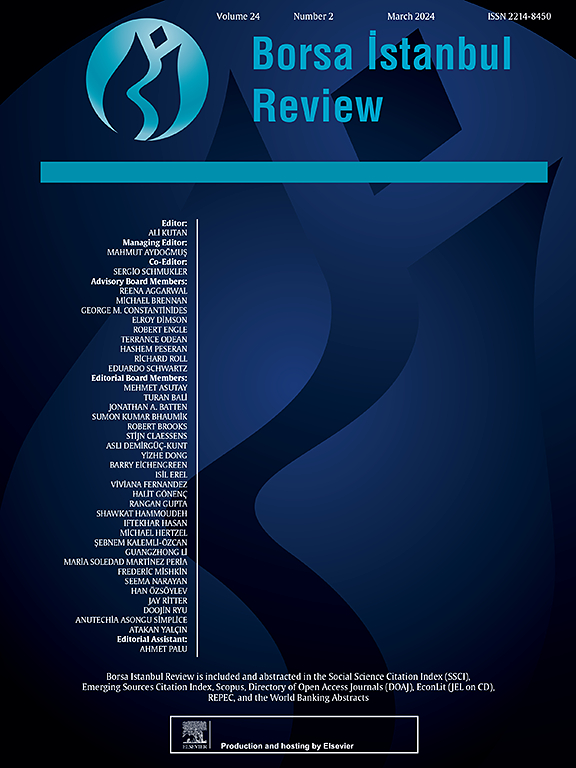制度环境和公司治理结构决定伊斯兰银行的可持续性绩效吗?伊斯兰金融业主要司法管辖区的证据
IF 6.3
2区 经济学
Q1 BUSINESS, FINANCE
引用次数: 0
摘要
本研究探讨了制度环境和公司治理结构对伊斯兰银行可持续发展绩效(SP)的影响。它采用两步系统广义矩法(GMM)估计法,分析了从 2016 年到 2021 年从九个主要伊斯兰金融管辖区收集的 32 家伊斯兰银行的面板数据。为了对伊斯兰银行的 SP 进行统一编码和量化,我们使用 GRI 推出的金融服务行业特定标准披露作为参考框架。然后,我们采用加权内容分析法对样本的可持续发展报告和年度报告进行分析。我们的研究结果表明,制度因素,特别是监管准则(监管同构)和伊斯兰银行对可持续金融网络规范的遵守(规范同构)目前并不是其可持续发展报告的决定因素。相反,我们观察到,可持续发展委员会的成立和可持续发展信息披露方面的更多经验提高了伊斯兰银行的可持续发展能力。与代理理论相反,我们发现董事会活动与可持续发展战略有显著的负相关关系。我们的研究结果的一个重要政策含义是,政策制定者应密切关注伊斯兰银行的监管依赖性,并加强其可持续发展生态系统,从而对其可持续发展战略产生积极影响。最后,未来的研究可以利用这些主要司法管辖区更有利于可持续发展转型的监管框架、更有效的规范结构、进一步披露可持续发展委员会的特征、制定适当的伊斯兰银行数字化水平衡量标准,以及提供更多实质性的可持续发展数据,以提供进一步的见解,更好地理解伊斯兰银行可持续发展战略的决定因素。本文章由计算机程序翻译,如有差异,请以英文原文为准。
Do institutional environment and corporate governance structures determine Islamic Banks’ sustainability performance? Evidence across key jurisdictions in Islamic finance industry
This study examines the impact of the institutional environment and corporate governance structures on Islamic banks' sustainability performance (SP). It applies a two-step System Generalized Method of Moments (GMM) estimator to analyze data gathered on a panel of 32 Islamic banks drawn from nine key Islamic finance jurisdictions from 2016 to 2021. To consistently code and quantify the Islamic banks' SP, we use the Specific Standard Disclosures for the Financial Services Sector introduced by the GRI as a framework of reference. Then, we employ the weighted content analysis method on the sustainability and annual reports of the subjected sample. Our findings indicate that the institutional factors specifically, regulatory guidelines (regulatory isomorphism) and the adherence of Islamic banks to the sustainable finance networks' specifications (normative isomorphism) are not currently determinants of their SP. Contrarily, we observe that the establishment of a sustainability committee and a better experience of sustainability disclosure improve Islamic banks' SP. In contrast to agency theory, board activity is identified to have a significantly negative relationship with SP. An important policy implication of our results is that policymakers should closely monitor Islamic banks' regulatory dependency and enhance their SF ecosystem to positively influence their SP. Finally, future research may leverage on more conducive regulatory frameworks to sustainability transition in these key jurisdictions, more effective normative structures, further disclosure of sustainability committee characteristics, the development of appropriate measures of Islamic banks' digitalization levels, and the availability of more material sustainability data to provide further insights and better understand the determinants of Islamic banks’ SP.
求助全文
通过发布文献求助,成功后即可免费获取论文全文。
去求助
来源期刊

Borsa Istanbul Review
Multiple-
CiteScore
7.60
自引率
3.80%
发文量
130
审稿时长
26 days
期刊介绍:
Peer Review under the responsibility of Borsa İstanbul Anonim Sirketi. Borsa İstanbul Review provides a scholarly platform for empirical financial studies including but not limited to financial markets and institutions, financial economics, investor behavior, financial centers and market structures, corporate finance, recent economic and financial trends. Micro and macro data applications and comparative studies are welcome. Country coverage includes advanced, emerging and developing economies. In particular, we would like to publish empirical papers with significant policy implications and encourage submissions in the following areas: Research Topics: • Investments and Portfolio Management • Behavioral Finance • Financial Markets and Institutions • Market Microstructure • Islamic Finance • Financial Risk Management • Valuation • Capital Markets Governance • Financial Regulations
 求助内容:
求助内容: 应助结果提醒方式:
应助结果提醒方式:


